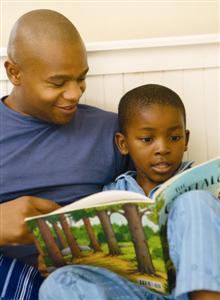 Hooked on Books
Hooked on Books
Research shows that exposure to books in early childhood – even in infancy – is critical to future reading development. It’s a building block for early learning experiences, contributing to language development, better grades in school and enhanced productivity in adult life.
In 2007, the National Center for Educational Statistics released its annual “Reading Report,” finding that a staggering 33 percent of all fourth-graders in this country still cannot read at even the basic level. Worse yet, deficient readers run higher risks of failure in personal, professional and social areas.
Even those who do read at grade level face additional challenges. For instance, as children age, research shows that time spent reading decreases. Eighth grade seems to be the tipping point where children stop reading for pleasure due to more homework and competing interests. On average, young people between the ages of 15 and 24 spend almost two hours a day watching TV, but only seven minutes of their daily leisure time reading.
So what can parents and caregivers do to give children a solid reading foundation and help them become life-long readers?
Feed their interests. Help your children find books or articles that focus on their interests; they’ll be more motivated to read about a topic that’s exciting to them. And respect their choices in reading materials – if it keeps them turning pages, it’s helping them. Praise their efforts. Positive reinforcement is a powerful motivator. Buy new books, and sell used books to offset costs.
Be a good role model. Let your child see you read. Talk about books that you’re reading and share interesting passages with them.
Give them plenty to read. Take them to the library regularly, and keep books and other reading materials in reach. It doesn’t matter if the materials are owned or borrowed, new or used; what’s important is that reading is a natural part of everyday life.
It’s been said that children become readers on the laps of their parents. Whether a single parent, working parent, grandparent or caregiver, adults have the power to enhance a child’s life, improve their learning and foster a life-long love of reading – and it all starts with, “Once upon a time …”
A Book for Every Child
Not everyone has the means to build up a home library. In fact, according to the U.S. Census Bureau, 12.8 million children live in poverty. Library use by low-income families drops dramatically if they live more than six blocks from a public library. And when school closes for holidays and vacations, these children often don’t have access to any books at all.
“Reading is the first step to getting an education and having a successful future,” says Karen Proctor, Vice President of Community Affairs at Scholastic, the global children’s publishing, education and media company, which strives to help children around the world to read and learn. “Literacy statistics in our country – especially for those living in poverty – are staggering. Exposing children to books and reading during their formative years is crucial. It is the responsibility of every community to encourage reading and help to improve the outlook for the next generation.”
To get books into the hands of economically disadvantaged children, The UPS Store is sponsoring the Marine Toys for Tots Foundation’s first year-round initiative, the Toys for Tots Literacy Program.
Throughout the year, participating The UPS Store locations are collecting donations for their Buck a Book program. All money donated to the Toys for Tots Literacy Program will place a book into the hands of an economically disadvantaged child.
Cash donations made through the Toys for Tots Literacy Program will be used to purchase books for children who need them most, as well as for libraries, schools and existing educational programs that support children in need. The program will help children in the communities where the funds are raised, or if an economic need does not exist in that community, in a neighboring area that has such a need.
For more information on the Toys for Tots Literacy Program, please visit www.ToysforTotsLiteracy.org.
What You Can Do to Help
Make a donation at participating The UPS Store locations or online at www.ToysforTotsLiteracy.org. Check with your local The UPS Store location to find out if they will be conducting a book drive. To find a location nearest you, go to www.TheUPSStore.com.



